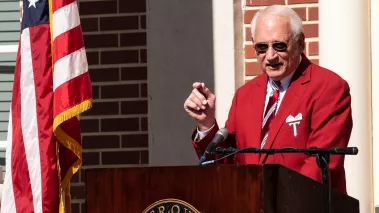Table of Contents
Leaked emails: Troy trustees suggest they’ll pressure faculty to keep company bigwigs, legislators, happy

Jake Crandall / The Montgomery Advertiser / USA TODAY NETWORK
Troy University chancellor Jack Hawkins Jr. speaks during the dedication of John Robert Lewis Hall in 2020. Leaked emails show Hawkins thinks there needs to be more control over faculty research and free speech on campus.
In February, Middle Tennessee State University economics professor Dan Smith spoke on a panel at Troy University’s Manuel Johnson Center for Political Economy. Smith, who previously worked at Troy, criticized Alabama’s economic incentive programs, suggesting they unfairly benefit Alabama’s politicians and large businesses. Smith’s comments apparently reached far beyond panel attendees, making waves among a number of those politicians and large businesses — including energy giant Alabama Power — who let Troy’s trustees know their displeasure.
While that may be par-for-the-course maneuvering, the reaction of Troy’s trustees is anything but. Leaked emails show them expressing frustration with the “negative spotlight” on Troy and with the “unnecessary distraction” Smith’s comment created. The trustees suggest Johnson Center faculty should be censored, and certain research curtailed, to ensure the politicians and large businesses are kept happy.
First reported by Alabama’s 1819 News, FIRE has independently obtained copies of the email exchange, which reads as an affront to academic freedom by a public university bound by the First Amendment to respect faculty’s right to research and teach, unbeholden to outside pressures.
In the March 15 email thread between three Troy trustees, Chancellor Jack Hawkins, Jr., expresses frustration at Smith’s comment and the fallout, saying “uncontrolled freedom of speech or academic research” cannot be allowed at the Johnson Center. He promises to meet with administrators “to discuss the Center and ‘how’ it prioritizes and vets topics which are appropriate for MJC staff to pursue.”
To the extent Troy has already directed faculty to vet their research based on political concerns, we call on Troy to remove those mandates — clearly and quickly.
“Got a call on this a few minutes ago,” Alabama State Bar president Gibson Vance responds. “I was told that several folks, including Alabama Power, are upset with us. In my opinion, this negative spotlight on Troy is both unfortunate and unnecessary.”
Alabama Bureau of Pardons and Paroles Director Cam Ward weighs in: “As I have said multiple times, I don’t know why we pick fights with an issue that the entire legislature and the Governor support.”
“Agreed,” Vance responds, “Is there a mechanism where we could communicate to those that care about this issue (Legislature, BCA, Alabama Power, etc.) that this is not the policy of Troy University? We have a very short window. Thanks!”
Actually, no thanks. Any attempt to “control” legitimate faculty research through coercion to please powerful interests would violate the university’s First Amendment obligation to respect academic freedom.
That is exactly what FIRE told Troy last week in a letter. As we explained:
Troy can no more withhold approval of a research topic because some might not agree with the thesis, or because it may make the university look bad, than it can punish a faculty member for presenting that same view in the classroom when it is pedagogically relevant. For any research proposal, it is possible that someone, upon encountering its point of view, will disagree with the topic or results. But faculty at public universities must retain full academic freedom to decide which topics are worthy of inquiry without meddling from Troy administrators.
Impermissible meddling would include calling faculty members into a meeting to discuss whether a First Amendment-protected topic is “appropriate” to pursue. As the emails show, such targeted inquiries by administrators with disciplinary authority would discourage faculty from discussing that topic. If such a meeting were to take place, it may reasonably cause faculty members to fear discipline for pursuing particular avenues of research, chilling their academic freedom.
And of course, Vance’s concern about Smith’s comment being misconstrued as official university policy is deeply misguided.
FIRE urged Troy to confirm it does not — and will not — impose viewpoint restrictions on faculty research at the Manuel Johnson Center. To the extent Troy has already directed faculty to vet their research based on political concerns, we call on Troy to remove those mandates — clearly and quickly.
Recent Articles
FIRE’s award-winning Newsdesk covers the free speech news you need to stay informed.

UT Dallas bars FIRE from speaking at student event

George Mason University calls cops on student for article criticizing Trump

Trump administration's coercion at Columbia is unlawful and unconstitutional


